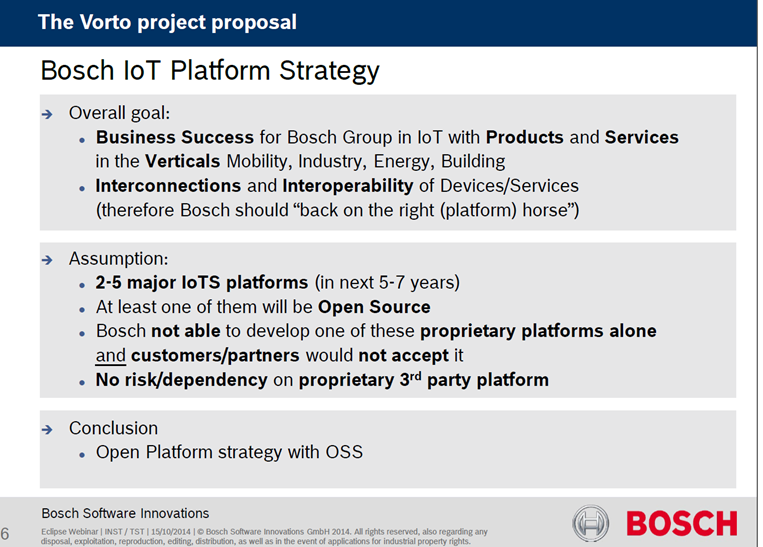Why Your IoT Product Strategy Needs to Include Open Source
For the last two years, I have been talking about why open source will be critical to the success of the Internet of Things. The current state of IoT/M2M is a lot of propriertary platforms and protocols. This can’t last and won’t win in the long term.
This week during a webinar about the new Vorto IoT project from Bosch, I saw the best illustration of why companies that don’t include open source in their product strategy will eventually fail. Check out this slide about the Bosch IoT Platform Strategy:
Bosch is one of the leading industrial companies in the IoT industry. They definitely get it and their analysis of the market is definitely worth considering. Consider each of their assumptions very carefully:
- 2-5 major IoTS platforms (in next 5-7 years) – At the start of every new technology innovation there are lots of different platforms that are developed. However, overtime the industry consolidates around 2-5 key providers, ex databases, web servers, Java servers, etc. This will happen in IoT.
- At least one of them will be Open Source – Open source has proven to be a provider of production quality software. In many markets, open source is the dominant supplier. There is no reason to believe that this will not be the case in IoT.
- Bosch not able to develop one of these proprietary platforms alone and customers/partners would not accept it – Developing a proprietary platform takes a LOT of development resources but more importantly a LOT of marketing, sales, and business development resources. Even a company as large as Bosch recognizes this fact. Companies like Google, Apple, IBM, SAP, Oracle, Salesforce, Microsoft plus some others may have the resources and skills to compete but most companies don’t. Most companies will need to identify their key value add for IoT. Providing a platform is not going to be a value add that is sustainable in the long-term.
- No risk/dependency on proprietary 3rd party platform – Bosch and other companies still need an IoT platform, so they are making a make vs buy decision. If they decide to not Make (see #3) then the buy decision comes down to a proprietary platform or an open source platform. Considering #2, deciding to go with an open source platform provides a lot more flexibility and less risk of being dependent on another company.
If you are setting a product strategy for an IoT product, you will be faced with a Make vs Buy decision. I think Bosch makes a pretty compelling case for open source. More importantly, Bosch has decided to be a leader in open source, ensuring they have a significant role and stake in the success.
Reason #2
The other reason open source is going to win is captured in by Matt Asay in his recent article. The answer of course is: Developers. As Matt points out ‘Developers aren’t going to go for proprietary standards.’ And as Matt points out, developers are attracted to code:
But let’s be clear: None of these companies lining up to join this or that foundation will prove dispositive in cementing any particular standard as theopen source standard. Developers do that.
And developers are attracted by tools and platforms that make them more productive, fast. Getting a marquee list of donors to a foundation is meaningless if the foundation doesn’t generate code that appeals to developers.
This is why what we are doing at Eclipse IoT is so important. We have code, sandbox servers and tutorials to make it easy for developers to get start with IoT.
It is clear code and openness will win in IoT. Join us in creating an amazing IoT open source community.
| Reference: | Why Your IoT Product Strategy Needs to Include Open Source from our JCG partner Ian Skerrett at the Ian Skerrett’s blog blog. |





